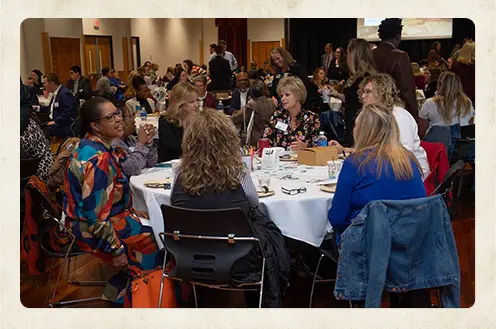
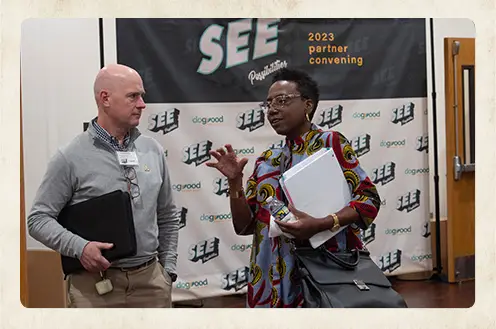
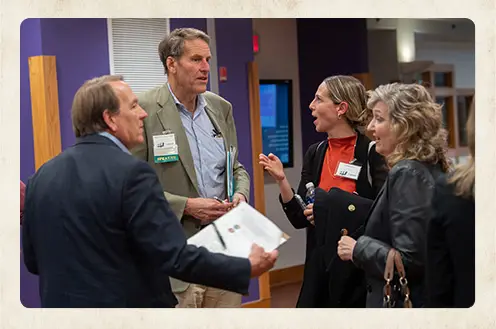
gathering
Steadfast connection and continuous learning are essential to achieving our purpose. At our second annual Convening held at Western Carolina University in October 2023, more than 350 of our partners gathered to reflect on what we learned through our collective work and to see the possibilities for our future work together. This Convening has grown and includes more time for attendees to connect, learn from each other and network across sectors and geographies.
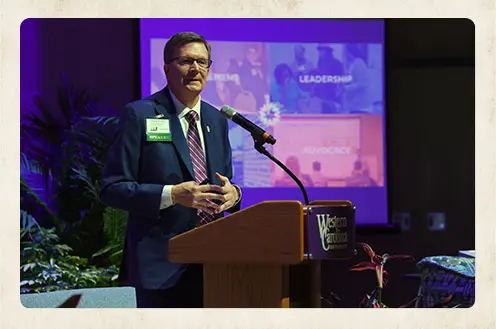
cohorts
Increasingly, Dogwood is establishing learning cohorts for funded partners who work collectively to address common challenges. Dogwood unites and supports these groups, which allow grantees to learn from each other and from experts in the field about best practices, opportunities to collaborate and ways to enhance the quality of programs and services. Importantly, the work of our cohorts also informs Dogwood’s future strategic approaches to addressing community challenges across WNC. Cohorts in 2023 focused on work in areas that include Access to Capital, Early Childhood Education, Community Health Workers, Oral Health and Opioid Settlement Planning, among other initiatives.
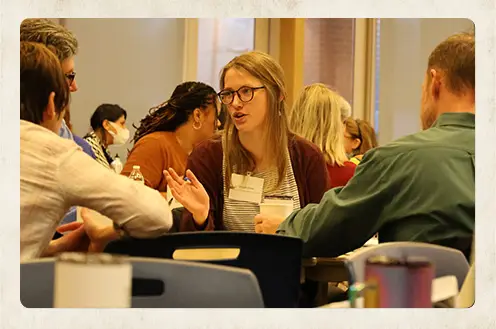
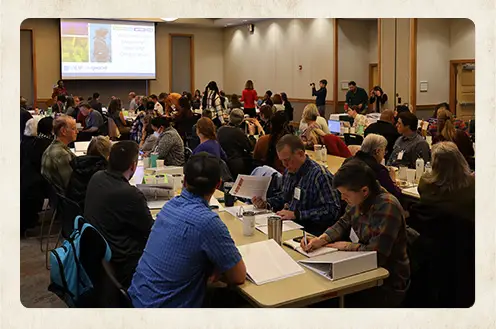
learning
While learning helps us better understand the needs of our region, it also illuminates next steps that fuel progress toward our goal of generational change. In 2023 we commissioned priority-specific reports and studies to establish clear baselines within several of our strategic areas. We also examined trends and data from expert sources. Through both numbers and stories, these data show where we are now and allow us to see the possibilities ahead.
Dogwood released the following four commissioned reports in 2023 to support and inform our priorities, partnerships and investments.
As part of our ongoing commitment to learning, Dogwood hosted webinars featuring the research experts from each commissioned study. More than 500 people attended these Community Investment webinars, and each report sparked additional conversations within groups across the region.
Additionally, Dogwood’s Next-Level Funding Webinar Series offered monthly gatherings for organizations to learn how to take their fundraising to the next level, increase grant support and diversify revenue streams.
A study that captures “the voices behind the numbers” to better understand summer learning recovery efforts in high schools in Western North Carolina.
An analysis of feedback collected from parents and early childhood education providers about the barriers to early care and education across 13 counties in Western North Carolina.
Results from an online survey of 83 OST providers operating more than 134 different programs, examining the locations and characteristics of OST programs in Western North Carolina.
This analysis offers insights about how the mill’s closing will affect the 18-county Western North Carolina economy.
empowering
our partners
A healthy and sustainable nonprofit infrastructure is critical for the future of Western North Carolina. Dogwood’s Sustainable Organizations focus is one element of our work in Community Equity, empowering organizations to do their best work through capacity-building initiatives and grant writing support.
capacity building
As Dogwood moves into its fifth year, we’ve learned through experience that we can’t simply grant our way out of the obstacles we face – our region also needs strong nonprofit organizations led by resourced, connected and empowered leaders. Increasingly, Dogwood is expanding capacity-building support for funded partners, so that they can be more effective in their work.
To accomplish this, Dogwood joined the WNC Nonprofit Pathways Funders Collaborative along with the Community Foundation of Western North Carolina, WNC Bridge Foundation, United Way of Asheville and Buncombe County, and Cherokee Preservation Foundation to underwrite programs that build organizational strength and effectiveness and ensure accessibility for regional nonprofits at low or no cost.
Last year, Dogwood also launched a pilot program with WNC Pathways, providing capacity-building support to selected, strategically aligned partners. Through workshops, training and coaching, grantees learned about nonprofit fundamentals, leadership, adaptive capacity, management and operations. Partners also received funding to engage a consultant of their choice to do deeper work on a project that advances their mission, in addition to general operating support.
– Jeannette Butterworth, WNC Nonprofit Pathways
leveraging resources
Dogwood’s Leverage Fund provides connections to and funding for professional grant writers on behalf of organizations interested in pursuing state, federal and national funding. In 2023, the Leverage Fund awarded $1.1 million in grants to 80 partners and provided $246,734 in grant writing assistance, enabling organizations to benefit from veteran grant writers.
As a small, new nonprofit working to address social, economic, educational and cultural inequities in Jackson and Graham Counties, Unidxs WNC actively engages and supports the Hispanic and Latino community – but faced a challenge in engaging the support of foundation funders. Unidxs was propelled forward by Dogwood’s Leverage Fund, which provided assistance from a seasoned, Spanish-speaking grant writer who helped Unidxs secure a $50,000 grant from another external foundation. Not only did this financial boost provide vital assistance, but it also gave the organization newfound credibility, opening doors to exciting collaborations and partnerships with other influential foundations.
– Ricardo Bello Ball, executive director, Unidxs
informing public policy
Imagine the possibilities in a region where public policies align seamlessly with public services. By supporting organizations that advocate for policies that align with Dogwood’s strategic priorities, Dogwood launched a formalized policy and advocacy body of work in 2023. This entailed participating in funders’ collaboratives and joining other foundations in co-funding statewide advocacy work impacting Western North Carolina.
Dogwood also made its first policy and advocacy grants in 2023 to four nonprofit advocacy partners, setting the stage for new and growing opportunities in the future that center the voices and perspectives of people and communities in WNC. One such grant-funded Medicaid expansion implementation increased access to preventative care and lowered medical debt across our region.
